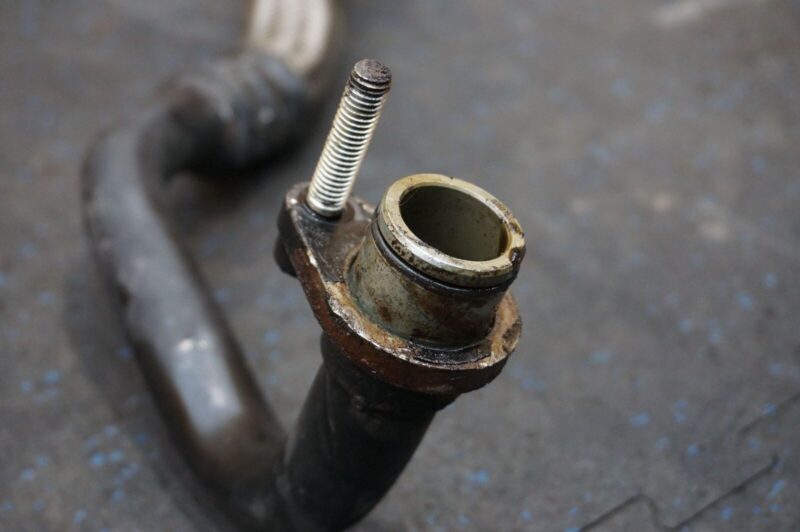When it comes to protecting and maintaining the integrity of your machinery, oil hose selection is an important factor. Making sure that you choose the right type of hose can be critical in preventing costly repairs or downtime due to a malfunctioning system.
In this article, we will discuss why choosing the right oil hose is so important and how it can help ensure that your machinery remains in top condition for years to come. Well also look at some key considerations when selecting an appropriate oil hose for your application.
By understanding these factors and making informed decisions about which type of oil hoses are best suited for your needs, you can rest assured knowing that you’ve taken all necessary precautions to protect your valuable equipment from potential harm.
Understanding the Dangers of Incorrect Oil Hose Selection
When it comes to oil hose selection, understanding the dangers of a poor decision is paramount. Incorrectly selecting an oil hose can have serious consequences for your machinery and its operations.
Such risks include breaks or leaks in the system that can lead to downtime, wasted resources, and hazardous spills into the environment. Additionally, improper selection could result in inadequate pressure tolerance or insufficient chemical resistance – both of which could cause costly damage to your machines over time.
To protect yourself from these potential disasters, thorough research must be conducted into any oil hoses you are considering before making a purchase decision. It’s important to pay attention not only to size but also material composition when choosing an oil hose; some materials may provide superior performance than others in certain applications while remaining cost-effective.
Consulting with industry experts on what type of hose is best suited for your needs is another way you can ensure you select one that will last and perform reliably under varying conditions. Once selected, proper installation techniques should always be followed so as not to compromise the safety and integrity of the system overall.
Given all these considerations that come along with selecting an appropriate oil hose for machinery use, taking extra precautions during this process is essential for safeguarding operations from unforeseen issues down the road.
Considerations for Optimal Oil Hose Selection

When selecting an oil hose, it is important to consider a few key factors. First and foremost, the oil hose must be able to withstand the pressure of the application without leaking or bursting.
Additionally, when choosing an oil hose, one should take into account its flexibility and temperature range capabilities to ensure that it can endure any extreme temperatures your machinery may encounter during operation. Furthermore, chemical compatibility is another factor you should keep in mind when selecting an optimal oil hose; if the material of the chosen hose cannot resist exposure to certain chemicals, it could cause damage or deterioration over time which could lead to costly repairs or replacements down the line.
Finally, consider durability as well as cost efficiency when making your decision; while opting for a more expensive model might seem like a good idea at first glance due to improved performance and longer lifespan –you should make sure that such improvements are worth investing in if they do not significantly impact your overall budget.
Guidelines for Selecting the Right Kind of Oil Hoses
When choosing the right kind of oil hose for your machinery, there are several important factors to consider. Firstly, you need to take into account the specific lubricating needs of your equipment.
Different types of hoses can be designed and manufactured depending on whether they will be used in air or water environments, with acidic or alkaline liquids, with low-pressure or high-pressure applications, etc. Secondly, it is equally important to consider the material that makes up the hose itself; rubber hoses may require more frequent replacement but provide greater flexibility and durability compared to plastic alternatives.
Finally, it is essential to factor in any additional safety measures needed when selecting an oil hose; this could include reinforced walls for extra strength and protection against bursting at higher temperatures as well as special seals if hazardous materials are involved. By considering all these elements when selecting an oil hose for your machinery you can ensure that its integrity and performance are not compromised over time.
Maintaining the Integrity of Your Machinery through Quality Oil Hose Choice

When it comes to maintaining the integrity of machinery, oil hose selection is a crucial factor. High-quality oil hoses are essential for the safety and effectiveness of machines.
Poorly-crafted hoses can lead to costly repairs or even catastrophic failures. Choosing an appropriate oil hose requires careful consideration; factors such as material composition, temperature tolerance, pressure capability, and size compatibility all need to be taken into account when making a decision.
The most common materials used in creating oil hoses are rubber or plastic with metal reinforcements like steel wire braiding or synthetic yarns added for additional strength and flexibility. Rubber allows for superior temperature resistance but may not be suitable if exposure to certain chemicals is expected; plastic on the other hand offers greater chemical resistance but will degrade more quickly under extreme temperatures than rubber does. Different types of reinforcement can also provide varying degrees of protection against abrasion damage depending on their design features, so choosing an appropriate one should be based on your specific needs.
Selecting the right sized oil hose is equally important since using too large a diameter could cause fluid loss due to excessive movement within the line while too small would increase flow restriction leading to reduced performance and higher operating pressures that may exceed safe limits causing system failure due to overstress on components. The desired pipe length must also be taken into account as longer lengths require more support brackets along its length which increase both cost and complexity during installation compared to shorter ones that require fewer supports thus saving time and money during assembly operations.
To ensure maximum performance from any machine its essential that high-quality parts are chosen – especially when it comes down to selecting an ideal oil hose – otherwise unexpected downtime could occur resulting in costly repair bills coupled with lost production time impacting profitability levels negatively in today’s highly competitive marketplace where every penny counts towards success!
Conclusion
Oil Hose selection is an important step in ensuring the integrity of your machinery. It is essential to choose the appropriate Oil Hose for the application to maximize the safety, performance, and reliability of your equipment.
High-quality oil hoses are designed with durable materials that can withstand extreme temperatures and pressure levels, helping protect against leakage or damage from external contaminants. By selecting a hose that meets all these requirements, you can ensure that your equipment will perform efficiently while also safeguarding its longevity and integrity over time.


